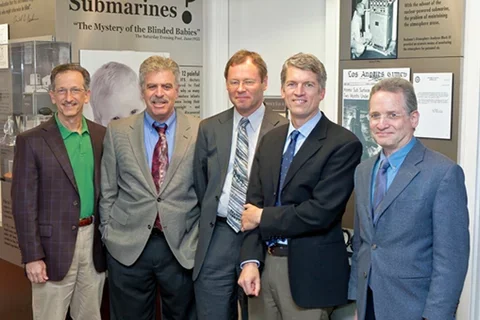NHLBI awards UC CTSAs $12 million for center for accelerated innovation

A consortium of the five University of California medical campuses at Davis, Irvine, Los Angeles, San Diego and San Francisco has received $12 million from the National Heart, Lung and Blood Institute (NHLBI) to establish one of three Centers for Accelerated Innovation. The award, among the first of its kind from NHLBI, recognizes the University of California's potential to translate its leading-edge discoveries into innovative products that benefit patients.
NHLBI issued grants totaling $31.5 million to establish three inaugural, multi-institutional Centers for Accelerated Innovation. In addition to the UC consortium, awardees are Boston Biomedical Innovation Center (Brigham and Women's Hospital, Boston Children's Hospital, Massachusetts General Hospital, and the President and Fellows of Harvard College) and Cleveland Clinic Innovation Accelerator (The Cleveland Clinic Lerner College of Medicine, Case Western Reserve University, Cincinnati Children's Hospital, The Ohio State University, and University of Cincinnati).
The University of California Center for Accelerated Innovation (UC CAI) will leverage the expertise and resources of the five state medical campuses and use industrial product-development practices to incubate technologies with high commercial potential. The five campuses accounted for 7 percent of NHLBI's fiscal year 2012 grant funding, providing a rich research base to support a diverse pipeline of diagnostics, devices, therapeutics and tools for heart, lung and blood diseases.
The UC CAI, whose administration will be based at UCLA, has four goals:
- Engage University of California heart, lung and blood disease innovators in entrepreneurism through a comprehensive education, training and mentorship program.
- Solicit and select technologies with high commercial potential that align with NHLBI's mission and address unmet medical needs or significant scientific opportunity.
- Incubate our most promising technologies in accordance with industry requirements to facilitate their transition to commercial products that improve patient care and enhance health.
- Create a high-performing sustainable infrastructure that will serve as a model to academic research centers.
The UC Biomedical Research Acceleration, Integration and Development (UC BRAID), which links the five medical campuses to facilitate contracting, data sharing, regulatory oversight and other activities, will oversee UC CAI.
"The launch of this program is a remarkable example inter-institutional collaboration," said Dr. Gary Firestein, director of the University of California, San Diego's Clinical and Translational Research Institute and chair of UC BRAID. "The leaders of engineering, business and medical schools across the five campuses developed a shared vision and worked with UC BRAID to create an extraordinary proposal. The new resources will dramatically accelerate the development of novel diagnostics, therapies and devices discovered at the University of California."
The new center will be closely integrated with the translational research institutes and centers on each campus funded by Clinical and Translational Science Awards (CTSA). The CTSA-funded centers and institutes will provide full access to research resources on each campus, including clinical research facilities and labs, access to research cores, biostatistical support, bioinformatics, pilot funding, regulatory consultations and research education and training.
UCLA and several community partners in June 2011 received a five-year CTSA award of $81.3 million to establish the Clinical and Translational Science Institute with Cedars-Sinai Medical Center, Charles R. Drew University and LA BioMed at Harbor-UCLA Medical Center.
The UC CAI also will have access to local biomedical industry organizations, healthcare agencies, clinical networks, public health departments, nonprofit research institutes, venture capitalists, investors and manufacturers of medical devices, diagnostic equipment and pharmaceuticals, which have developed close interactions with CTSA-funded institutes and centers.
"This is an excellent example of what we can accomplish through our CTSAs by collaborating across University of California campuses and disciplines for effective translation of our discoveries to products that will help our patients," said Dr. Steven Dubinett, director of the UCLA Clinical and Translational Science Institute.
In addition to the considerable support from the CTSAs, each campus will bring its own unique expertise and resources.
Innovators can access resources across all five campuses, including UCLA's tissue array and translational pathology cores, San Diego's biomarker and cardiovascular physiology core, San Francisco's small molecule discovery center and airway clinical research center, Irvine's mechanical testing, microscopy and cell and tissue cores specifically for cardiovascular technology and Davis' animal research center.
A skills development program will provide training and education in entrepreneurism and coordinated access to expert mentors. This educational training will help bridge the gap for scientists who lack an understanding of the commercialization potential of their discoveries.
"By aligning our efforts, researchers will have broad access to an even broader array of research cores and education programs," said Dr. Lars Berglund, director of the Davis Clinical and Translational Science Center. "This collaboration will offer robust internship programs, expanded partnerships with outside private and public organizations and new curricular offerings to enrich and complement our already innovative approaches, while not detracting from or prolonging the existing training time."
Faculty with experience in heart, lung and blood diseases will be available to innovators for consultations. Project managers with experience in industry and academia will ensure technologies developed by the center meet timelines and benchmarks.
"We have worked strategically with our collaborators to ensure a nimble, efficient, and transparent project management effort," said Dr. Dan Cooper, director of the Irvine Institute for Clinical and Translational Science. "We have embedded mechanisms to ensure that specific goals for each project are established and timelines clear. We will work across BRAID to identify delays and obstacles and deal with them as rapidly as possible."
"Each of the UCs is a powerhouse, but together they are unstoppable," said Dr. Clay Johnston, director of the Clinical and Translational Science Institute in San Francisco. "There is so much more we can do in collaboration and UC BRAID is helping us realize that."
Dr. Michael Palazzolo, a Professor of Medicine at UCLA, is the PI.
Further reading:
NHLBI Release: http://www.nhlbi.nih.gov/news/press-releases/2013/nih-launches-new-centers-to-accelerate-lab-innovations-to-improve-public-health.html
NBC 4 Los Angeles: http://s3.amazonaws.com/TVEyesMediaCenter/UserContent/183862/2382847.9463/KNBC_09-27-2013_17.50.50.mp4
Image caption: UC Biomedical Research Acceleration, Integration, and Development (UC BRAID) program leaders, left to right: Gary S. Firestein, MD (UC San Diego); Dan M. Cooper, MD (UC Irvine); Lars Berglund, MD, PhD (UC Davis); Clay Johnston, MD, PhD (UCSF); and Steven M. Dubinett, MD (UCLA)
Image source:



